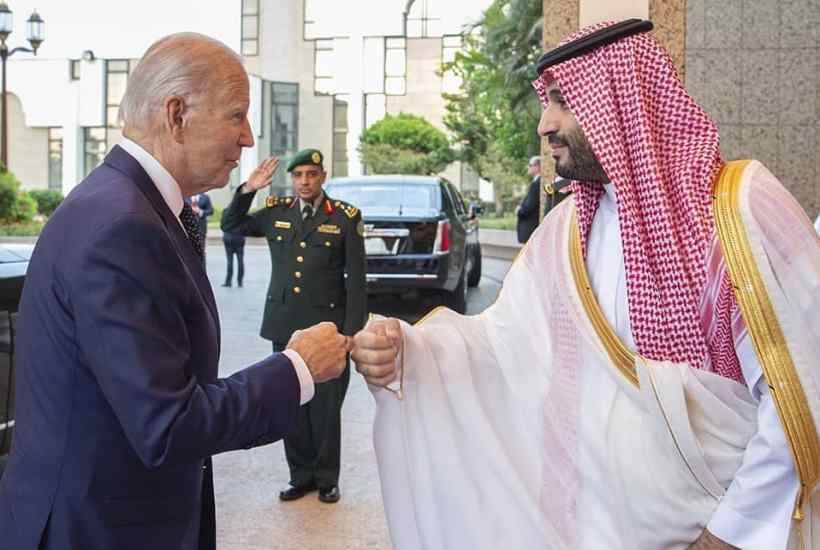How outraged should we be that Saudi Aramco has reported a world-record quarterly profit of $48 billion, representing a giant bonus from the global oil price spike provoked by the war in Ukraine? Well, that’s how the cookie crumbles when you’re sitting on oil reserves so abundant and so easily accessible that your marginal cost of producing the next barrel is less than $10 when the market price has just doubled to $130 – as it did in March, before settling back to around $95 today.
And you might think that this recent price retreat is likely to continue as oil demand begins to shrink with the onset of recession in developed economies – just as you worry that your own reserves will one day dwindle. So reaping maximum short-term returns is the best thing you can do for your still underdeveloped desert country, especially if (as Aramco likes to do) you can present a narrative about reinvesting some of the proceeds in hydrogen and other green technologies that will eventually take you to net zero.
That’s evidently the way Saudi leader Mohammed bin Salman – MBS for short, best known for denying that he ordered the murder of the dissident journalist Jamal Khashoggi – was thinking last month at the moment of his infamous fist-bump with Joe Biden in Jeddah. That gesture of deferential recognition by the US President, and his request for help to ease oil supply, earned what was widely called ‘a slap in the face’ from the Saudi-led Opec group of oil-producing countries, in the form of a token 100,000 barrels-per-day production increase – when Opec’s own forecast says daily global demand is about to exceed 100 million barrels.
Meanwhile, MBS’s kinsman Prince Alwaleed bin Talal is reported to have invested half a billion dollars in three sanctioned Russian oil companies, Gazprom, Rosneft and Lukoil, just as the war was kicking off. To answer my opening question, outrage at any one-off windfall profit is generally pointless – but what this story tells us is that the super-rich Saudis regard western powers as supplicants who can be gamed to advantage, and the pariah that is Putin’s Russia as a regime they can do business with. That’s the realpolitik – and it ain’t going to help any of us through the current energy crisis.
Flattening the peak
Speaking of which, there’s small comfort to be had from the news that Centrica’s Rough gas storage site under the North Sea off the Yorkshire coast – whose closure in 2017 was lamented by James Forsyth last week – has been approved for reopening next month. Even if the facility only holds a few days’ worth of fuel, it should ease the risk of shortages and shutdowns at periods of peak demand. But there’s no practical proposal so far that comes close to addressing the central and most certain feature of this crisis, which is the rise and rise again of domestic and business energy bills, driven inexorably by the global price of gas.
Sir Keir Starmer’s proposal of a temporary consumer price freeze, costly to the Treasury though it would be, might have some merit if it would subdue inflation and hold off business bankruptcies as well as meeting the urgent priority of allowing poorer households to stay warm through the winter. But it’s not going to happen, because he’s not in power and a Truss government, if that’s what’s coming, isn’t going to borrow it from him.
Instead we’re promised unfocused tax cuts plus possible reductions in VAT and green levies. But what the new administration should borrow, whether from policy thinkers of any stripe or from the energy companies themselves, are ideas that might create a less crisis-prone energy market while flattening the peak and spreading the impact forward beyond the point (most likely following an eventual ceasefire in Ukraine) at which gas prices begin falling back to normality.
Best so far is a scheme floated by Scottish Power and Eon (and reported in the Sunday Times) for a bank-funded, government-backed ‘deficit fund’ that would enable suppliers to cap customers’ bills for two years uncoupled from global prices, borrow the resultant shortfall and pay it back over ten to 15 years. Let’s face it, ministers alone can’t repair the ravages of this geopolitical earthquake, nor can the forces of free-market capitalism. But an enlightened combination of ‘whatever it takes’ government and long-term strategic business leadership surely holds that power.
The Brits are back
At least I’ve spotted one entrepreneur with a spring in his step, despite all of the above: he’s the local estate agent in La France profonde and he’s never been busier. French city-dwellers took to buying rural property during the pandemic and haven’t stopped. More surprisingly, he tells me, ‘the Brits are back’ after several years in which many sold up and returned to Blighty. This summer – despite the weak pound, reinforced pet passport bureaucracy and the Schengen area’s rolling-90-days-in-180 residency limit – British buyers are so keen that some sales are completed without a visit, merely on the basis of a FaceTime tour.
What’s happening? The surge is in part a spin-off from what Rightmove calls the ‘frenzied’ rise of UK house prices over the past two years. This month’s seasonal dip may herald a weaker market in the autumn – but even so, if you can sell your suburban semi for a million, less than half the proceeds will buy you a small medieval château in my own Dordogne village or a farmhouse with two letting gîtes just over the hills in the Lot. And despite inflation, the cash left over could fund you for a decade.
The other factor is relentless doomsterism from home. Try sitting on a sunlit French breakfast terrace listening to the Today programme’s recital of miseries to come, from power cuts and crop failures to NHS collapse. Last week’s Spectator Diary by Sarah Vine, sent from a few miles further south, caught that feeling exactly. Her punchline, ‘You know where to find me, Santé’, summed up a property boom no one saw coming.
Got something to add? Join the discussion and comment below.
Get 10 issues for just $10
Subscribe to The Spectator Australia today for the next 10 magazine issues, plus full online access, for just $10.
You might disagree with half of it, but you’ll enjoy reading all of it. Try your first month for free, then just $2 a week for the remainder of your first year.















Comments
Don't miss out
Join the conversation with other Spectator Australia readers. Subscribe to leave a comment.
SUBSCRIBEAlready a subscriber? Log in